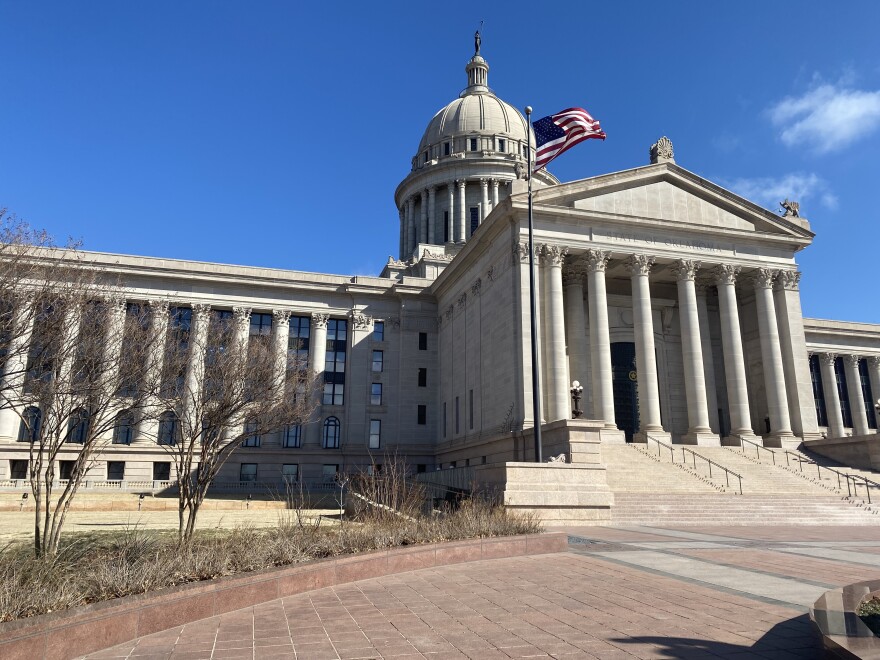A critical state audit report and the effect of a little known legislative procedure known as "shucking" highlights a hectic week at the state Capitol.
TRANSCRIPT
Dick Pryor: This is Capitol Insider - taking you inside politics, policy and government in Oklahoma. I'm Dick Pryor with Quorum Call publisher Shawn Ashley. Shawn, on Tuesday State Auditor and Inspector Cindy Bird released an audit of the state's handling of federal funds in fiscal year 2022. The annual audit looks at whether the state spent federal grant money in compliance with federal regulations. What did the audit find?
Shawn Ashley: The audit found a series of what Bird called “systematic problems that affected several agencies,” and at least one program that began at the Office of Management and Enterprise Services, OMES, which the audit states “was solely responsible for the proper and legal administration of federal grant funds.” The problems included a pilot program that was not authorized by the legislature, called Rolling Solicitations, where OMES directors, the Chief Information Officer and the Purchasing Director gave themselves permission to place any vendor of their choice on a list to be awarded state contracts without a competitive bid. “In my opinion,” Bird said, “Oklahoma is rapidly becoming a no bid state. This is a grave disservice to every Oklahoman. The rolling solicitation design,” she said, “allows for circumvention of financial safeguards and could place potentially better state vendors at an unfair disadvantage.”
Dick Pryor: After release of the audit, Attorney General Gentner Drummond called for the resignation of Secretary of Tourism and Director of the Oklahoma Tourism and Recreation Department, Shelley Zumwalt. Why did Drummond make that call and what was Zumwalt’s response?
Shawn Ashley: Drummond said Zumwalt used her position as executive director of the Oklahoma Employment Security Commission, where she was then employed, to approve millions of dollars in contracts for a software company where her husband was a vice president. “This level of self-dealing,” he said, “represents an unforgivable breach of trust that disqualifies Ms. Zumwalt from overseeing the expenditure of our tax dollars.” Zumwalt noted she was not involved in the selection of the company to work with the Employment Security Commission. She discussed the situation with OMES legal counsel before she was appointed executive director of the commission and with both agencies’ legal counsels while serving as director. Zumwalt said she was assured throughout the process there was no conflict of interest. “I will not be resigning,” she told reporters Tuesday evening.
Dick Pryor: Now, moving to the legislature. We've talked about it before and in the last few days, the legislative practice of “shucking” bills has come up again. First, what is shucking?
Shawn Ashley: Shucking occurs when a member amends a bill by completely removing its existing language and entirely replacing it with new language that does something entirely different than what the bill previously was intended to do.
Dick Pryor: At least two bills were shucked in the last week, with new bill language inserted. One of them concerned deleting language from a bill about insurance coverage for education employees during a leave of absence and replacing that with bill language to limit the age of state appellate judges and justices. This practice seems to subvert the regular legislative process.
Shawn Ashley: It does. It allows the new proposal to skip ahead in line, so to speak. Now, there can be good reasons for doing that, like when a situation arises that requires legislation and lawmakers want to deal with the issue quickly. Then there are the not so good, sometimes even nefarious reasons. Usually this involves a proposal or language that did not get heard earlier in the legislative session and appears to have died, but it can be revived and move forward in the legislative process by shucking another bill.
Dick Pryor: Shawn, what should we focus on in the week ahead?
Shawn Ashley: Well, there are those three words: budget, budget, budget. And we're waiting for the Senate and the House to come to some sort of an agreement, perhaps with the governor, and provide the FY 2025 budget.
Dick Pryor: Thank you, Shawn.
Shawn Ashley: You're very welcome.
Dick Pryor: For more information, go to quorumcall.online. You can find audio and transcripts at kgou.org. And look for Capitol Insider where you get podcasts. Until next time, with Shawn Ashley, I'm Dick Pryor.
KGOU produces journalism in the public interest, which is critical to an informed electorate. Listeners like you provide essential funding for Capitol Insider. Make your contribution at KGOU.org.






